India Opposes WTO Discussion on Labour, Environment: Official
By Rediff Money Desk, NEWDELHI Feb 07, 2024 15:29
India reiterates its stance that labour and environment are non-trade issues and should not be discussed at the WTO, highlighting the potential for protectionist measures under the guise of sustainable development.
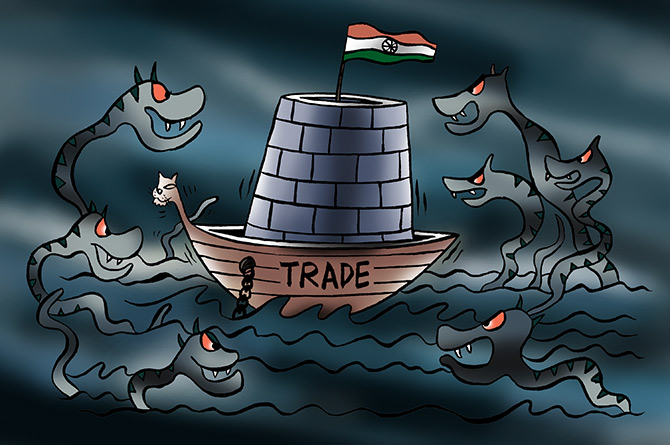
New Delhi, Feb 7 (PTI) India is maintaining its stand that issues like labour, and environment are non-trade issues and they should not be discussed at the World Trade Organisation (WTO), an official said on Wednesday.
The official said trade barriers should not be erected under the guise of sustainable development and there are different multilateral forums like in the United Nations where these issues can be discussed.
The remarks assume significance as the trade ministers of 164 countries will gather at Abu Dhabi later this month to deliberate on issues such as agriculture. Developed nations are pushing to start formal talks on these non-trade issues and they would try to push in this meeting.
The 13th Ministerial Conference (MC) will be held from February 26-29 at Abu Dhabi, UAE. MC is the highest decision making body of the Geneva-based multilateral trade body.
"Issues like environment and labour are non-trade issues. These are non-negotiable at WTO. We are sticking to that stand. There are specialised bodies where these issues should be discussed. These are not trade issues but it has a trade implication," the official said.
Expressing concerns over the emerging trend of using environmental measures as protectionist non-tariff measures, India has also submitted a paper on this in the WTO in May last year. In that, the country has emphasised that there is an increase in the use of unilateral measures such as EU's carbon tax and deforestation law which is impacting trade.
"Such measures may not only violate the rules of the WTO but also have systemic implications for international law as a whole, since unilateral action undermines multilaterally negotiated rights and obligations of countries," the official, who does not wish to be named, said.
Earlier a number of countries, including India, Russia, and Brazil, had flagged concerns over European Union's (EU) carbon tax and deforestation regulation in a meeting of the WTO in Geneva, stating that these measures would affect their industries.
The European Union (EU) has decided to impose a carbon tax CBAM (Carbon Border Adjustment Mechanism) on certain sectors like steel, cement, fertiliser, aluminium and hydrocarbon products from 2026. In 2022, India's 27 per cent exports of iron, steel and aluminium products worth USD 8.2 billion went to the EU.
According to a report by the think-tank Global Trade Research Initiative (GTRI), India's exports of products like coffee, leather hides and paperboard worth USD 1.3 billion annually to the EU will get impacted due to the deforestation regulation adopted by the EU last year.
"Measures taken to combat climate change, including unilateral ones should not constitute a means of arbitrary or unjustifiable discrimination or a disguised restriction on international trade," the official said.
Developed countries are also pushing to include women economic empowerment issues in the WTO talks. On this, India is of the view that it is a social and domestic matter and there are specialised conventions of the UN to discuss these.
"So we will not agree to any work program, we will agree to discussions to promote sustainable development but our rights and obligations should not be impacted," the official added.
On CBAM, India is engaging with the EU to deal with the matter and also preparing its domestic industry to comply with the norms as it has export opportunities also.
"We are engaging with the EU to find out how we can comply with that and how our industry and trade do not suffer from this tax," the official added.
The final agenda of the MC13 meeting is expected to be finalised in the General Council (GC) meeting of the WTO on February 14 at Geneva.
"The purpose of the trade is to ensure sustainable development. So under the guise of this, developed countries can not erect protectionist barriers, this is our submission," the official said.
The official said trade barriers should not be erected under the guise of sustainable development and there are different multilateral forums like in the United Nations where these issues can be discussed.
The remarks assume significance as the trade ministers of 164 countries will gather at Abu Dhabi later this month to deliberate on issues such as agriculture. Developed nations are pushing to start formal talks on these non-trade issues and they would try to push in this meeting.
The 13th Ministerial Conference (MC) will be held from February 26-29 at Abu Dhabi, UAE. MC is the highest decision making body of the Geneva-based multilateral trade body.
"Issues like environment and labour are non-trade issues. These are non-negotiable at WTO. We are sticking to that stand. There are specialised bodies where these issues should be discussed. These are not trade issues but it has a trade implication," the official said.
Expressing concerns over the emerging trend of using environmental measures as protectionist non-tariff measures, India has also submitted a paper on this in the WTO in May last year. In that, the country has emphasised that there is an increase in the use of unilateral measures such as EU's carbon tax and deforestation law which is impacting trade.
"Such measures may not only violate the rules of the WTO but also have systemic implications for international law as a whole, since unilateral action undermines multilaterally negotiated rights and obligations of countries," the official, who does not wish to be named, said.
Earlier a number of countries, including India, Russia, and Brazil, had flagged concerns over European Union's (EU) carbon tax and deforestation regulation in a meeting of the WTO in Geneva, stating that these measures would affect their industries.
The European Union (EU) has decided to impose a carbon tax CBAM (Carbon Border Adjustment Mechanism) on certain sectors like steel, cement, fertiliser, aluminium and hydrocarbon products from 2026. In 2022, India's 27 per cent exports of iron, steel and aluminium products worth USD 8.2 billion went to the EU.
According to a report by the think-tank Global Trade Research Initiative (GTRI), India's exports of products like coffee, leather hides and paperboard worth USD 1.3 billion annually to the EU will get impacted due to the deforestation regulation adopted by the EU last year.
"Measures taken to combat climate change, including unilateral ones should not constitute a means of arbitrary or unjustifiable discrimination or a disguised restriction on international trade," the official said.
Developed countries are also pushing to include women economic empowerment issues in the WTO talks. On this, India is of the view that it is a social and domestic matter and there are specialised conventions of the UN to discuss these.
"So we will not agree to any work program, we will agree to discussions to promote sustainable development but our rights and obligations should not be impacted," the official added.
On CBAM, India is engaging with the EU to deal with the matter and also preparing its domestic industry to comply with the norms as it has export opportunities also.
"We are engaging with the EU to find out how we can comply with that and how our industry and trade do not suffer from this tax," the official added.
The final agenda of the MC13 meeting is expected to be finalised in the General Council (GC) meeting of the WTO on February 14 at Geneva.
"The purpose of the trade is to ensure sustainable development. So under the guise of this, developed countries can not erect protectionist barriers, this is our submission," the official said.
Read More On:
DISCLAIMER - This article is from a syndicated feed. The original source is responsible for accuracy, views & content ownership. Views expressed may not reflect those of rediff.com India Limited.
You May Like To Read
TODAY'S MOST TRADED COMPANIES
- Company Name
- Price
- Volume
- Srestha Finvest
- 0.67 (+ 1.52)
- 61783280
- Vodafone Idea L
- 7.89 ( -6.63)
- 52779164
- GTL Infrastructure
- 2.12 ( -2.75)
- 24665509
- Standard Capital
- 1.10 ( -3.51)
- 21492885
- AvanceTechnologies
- 0.86 ( -3.37)
- 18109252
MORE NEWS

Royal Enfield Unveils Electric Bike Flying Flea...
Royal Enfield enters the electric bike segment with the Flying Flea C6, a...

Sagility India IPO: Rs 945 Cr Anchor Investor...
Sagility India, a healthcare tech services provider, raised Rs 945 crore from anchor...

Sebi Demands Rs 130 Crore from 5 Entities in...
Sebi has issued demand notices to five entities, including Netizen Engineering and Citi...



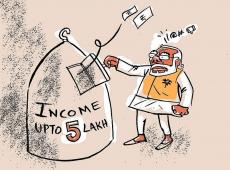
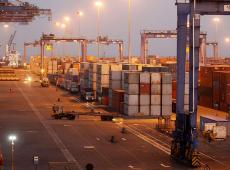


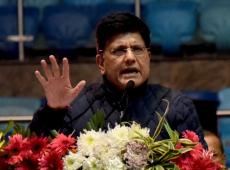

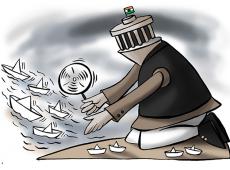
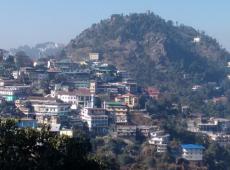
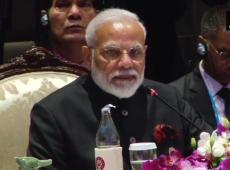
 © 2024 Rediff.com India Limited. All rights reserved.
© 2024 Rediff.com India Limited. All rights reserved.